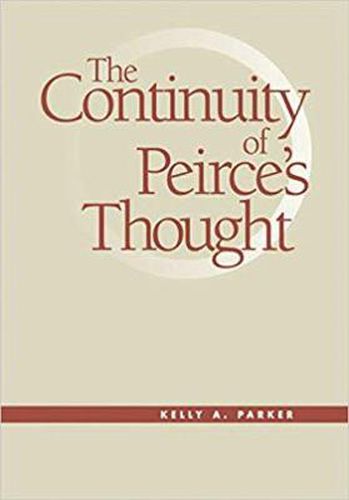Readings Newsletter
Become a Readings Member to make your shopping experience even easier.
Sign in or sign up for free!
You’re not far away from qualifying for FREE standard shipping within Australia
You’ve qualified for FREE standard shipping within Australia
The cart is loading…






This title is printed to order. This book may have been self-published. If so, we cannot guarantee the quality of the content. In the main most books will have gone through the editing process however some may not. We therefore suggest that you be aware of this before ordering this book. If in doubt check either the author or publisher’s details as we are unable to accept any returns unless they are faulty. Please contact us if you have any questions.
A comprehensive and systematic reconstruction of the philosophy of Charles S. Peirce, perhaps America’s most far-ranging and original philosopher, which reveals the unity of his complex and influential body of thought. We are still in the early stages of understanding the thought of C. S. Peirce (1839-1914). Although much good work has been done in isolated areas, relatively little considers the Peircean system as a whole. Peirce made it his life’s work to construct a scientifically sophisticated and logically rigorous philosophical system, culminating in a realist epistemology and a metaphysical theory (synechism) that postulates the connectedness of all things in a universal evolutionary process.
In The Continuity of Peirce’s Thought, Kelly Parker shows how the principle of continuity functions in phenomenology and semeiotics, the two most novel and important of Peirce’s philosophical sciences, which mediate between mathematics and metaphysics. Parker argues that Peirce’s concept of continuity is the central organizing theme of the entire Peircean philosophical corpus. He explains how Peirce’s unique conception of the mathematical continuum shapes the broad sweep of his thought, extending from mathematics to metaphysics and in religion. He thus provides a convenient and useful overview of Peirce’s philosophical system, situating it within the history of ideas and mapping interconnections among the diverse areas of Peirce’s work.
This challenging yet helpful book adopts an innovative approach to achieve the ambitious goal of more fully understanding the interrelationship of all the elements in the entire corpus of Peirce’s writings. Given Peirce’s importance in fields ranging from philosophy to mathematics to literary and cultural studies, this new book should appeal to all who seek a fuller, unified understanding of the career and overarching contributions of Peirce, one of the key figures in the American philosophical tradition.
$9.00 standard shipping within Australia
FREE standard shipping within Australia for orders over $100.00
Express & International shipping calculated at checkout
This title is printed to order. This book may have been self-published. If so, we cannot guarantee the quality of the content. In the main most books will have gone through the editing process however some may not. We therefore suggest that you be aware of this before ordering this book. If in doubt check either the author or publisher’s details as we are unable to accept any returns unless they are faulty. Please contact us if you have any questions.
A comprehensive and systematic reconstruction of the philosophy of Charles S. Peirce, perhaps America’s most far-ranging and original philosopher, which reveals the unity of his complex and influential body of thought. We are still in the early stages of understanding the thought of C. S. Peirce (1839-1914). Although much good work has been done in isolated areas, relatively little considers the Peircean system as a whole. Peirce made it his life’s work to construct a scientifically sophisticated and logically rigorous philosophical system, culminating in a realist epistemology and a metaphysical theory (synechism) that postulates the connectedness of all things in a universal evolutionary process.
In The Continuity of Peirce’s Thought, Kelly Parker shows how the principle of continuity functions in phenomenology and semeiotics, the two most novel and important of Peirce’s philosophical sciences, which mediate between mathematics and metaphysics. Parker argues that Peirce’s concept of continuity is the central organizing theme of the entire Peircean philosophical corpus. He explains how Peirce’s unique conception of the mathematical continuum shapes the broad sweep of his thought, extending from mathematics to metaphysics and in religion. He thus provides a convenient and useful overview of Peirce’s philosophical system, situating it within the history of ideas and mapping interconnections among the diverse areas of Peirce’s work.
This challenging yet helpful book adopts an innovative approach to achieve the ambitious goal of more fully understanding the interrelationship of all the elements in the entire corpus of Peirce’s writings. Given Peirce’s importance in fields ranging from philosophy to mathematics to literary and cultural studies, this new book should appeal to all who seek a fuller, unified understanding of the career and overarching contributions of Peirce, one of the key figures in the American philosophical tradition.